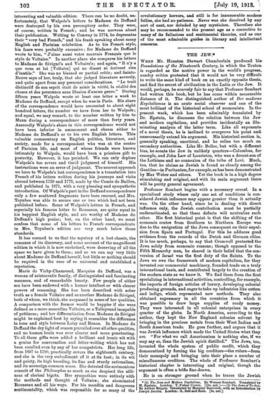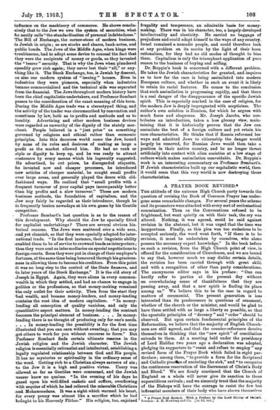THE JEW.*
WHEN Mr. Houston Stewart Chamberlain produced hie Foundations of the Nineteenth Century, in which the Teuton is regarded as the motive power in the world's progress, sundry critics protested that it would not be very difficult to write the same kind of book on an exactly opposite thesis, and find the secret of civilization in the Latin or the Jew. It would, perhaps, be scarcely fair to say that Professor Sombart had written this book, but he has come within measurable distance of it. The distinguished author of Der ntoderne Kapitalisntus is an acute social observer and one of the most brilliant of the historical school of economists. In the present work, which has been admirably translated by Dr. Epstein, he discusses the relation between the Jew and modern capitalism, and provides incidentally an illu- minating analysis of the latter term. Like all exponents. of a novel thesis, he is inclined to overprove his point and unnecessarily extend his argument. His historical section is, generally speaking, uncritical, and he relies too much on secondary authorities. Like Mr. Belloc, but with a different bias, he scents the Jew in unlikely quarters—Columbus, for example, and John Law of Lauriston, who was a decent son of the Lothians and no connexion of the tribe of Levi. Much, too, that he claims as Jewish is found as clearly among the Gentiles—in Puritanism, for example, as has been demonstrated by Max Weber and others. Yet the book is in a high degree stimulating and original, and with its main argument there- will be pretty general agreement.
Professor Sombart begins with a necessary caveat. In sr specialized study where only one set of conditions is con- sidered Jewish influence may appear greater than it actually was. On the other hand, since he is dealing with direct influence only, the Jewish contribution must be partially underestimated, so that these defects will neutralize each other. His first historical point is that the shifting of the economic centre from Southern to Northern Europe was- due to the emigration of the Jews consequent on their expul- sion from Spain and Portugal. For this he adduces good evidence from the records of the Dutch and German cities. It is too much, perhaps, to say that Cromwell protected the Jews solely from economic reasons ; though opposed to the Fifth Monarchy men, he shared in their belief that the con- version of Israel was the first duty of the Saints. To the Jews we owe the framework of modern capitalism, for they invented our commercial machinery, founded trade on a truly international basis, and contributed largely to the creation of the modern state as we know it. We find them from the first specializing in international activities, controlling, for example, the imports of foreign articles of luxury, developing colonial producing grounds, and eager to take up industries like cotton and indigo, which represented new methods. They also obtained supremacy in all the countries from which it was possible to draw large supplies of ready money. They were interested in all colonial enterprises in every quarter of the globe. In North America, according to the author, they kept the New England colonies solvent by bringing in the precious metals from their West Indian and South American trade. He goes further, and argues that it was Jewish influence which made the United States what they are. "For what we call Americanism is nothing else, if we may say so, than the Jewish spirit distilled." The Jews, too, invented the whole system of public credit, which they democratized by forcing the big creditors—the rulers—from their monopoly and bringing into their place a number of miscellaneous creditors. The whole of Professor Sombart's historical chapter is interesting and original, though the argument is often a trifle fine-drawn.
He is on stronger ground when he traces the Jewish
• (1) The Jews and Modern Capitalism. By Werner Sombart. Translated by M. Epstein. London T. Fisher Unwin. [15s. net]—(2) The Jews of To-day. By Arthur Ruppin. Translated by Margery Bentwieh, with an Introduction by Joseph Jacobs. London: (L Bell and Sons. [6s. net.] influence on the machinery of commerce. He shows conclu-- -sively that to the Jew we owe the system of securities; what tie neatly calls "the standardization of personal indebtedness." The Bill of Exchange, the corner-stone of modern business, is Jewish in origin ; so are stocks and shares, bank-notes, and public bonds. The Jews of the Middle Ages, when kings were 'troublesome, had to adopt some device to conceal the fact that they were the recipients of money or goods, so they invented the " bearer" security. That is why the Jews when plundered 'speedily grew rich again; they never lost their "all," or any- 'thing like it. The Stock Exchange, too, is Jewish by descent, as also our modern system of " issuing " houses. Even in industries they were pioneers, especially when industries became commercialized and the technical side was separated from the financial. The. Jews throughout modern history have been the chief capitalistic undertakers, and Professor Sombart passes to the consideration of the exact meaning of this term. During the Middle Ages trade was a stereotyped thing, and -the activity of the trader was circumscribed by convention and sometimes by law, both as to profits and methods and as to locality. Advertising and other modern business devices were regarded as unworthy of the dignity of the stately mer- chant. People believed in. a "just price" as something governed by religious and ethical rather than economic principles. Into this decorous world came the Jew, bound by none of its rules and desirous of making as large a profit as the market allowed him. He had no rank or style or dignity to keep up, and he was ready to attract -customers by every meana which. his ingenuity suggested. He advertised, he cut prices, he disregarded. etiquette, ire invented new and cheaper processes, he introduced mew articles of cheaper material, he sought small profits over large areas, and generally played the deuce with old- fashioned ways. He realized that "small profits with a frequent turnover of your capital pays incomparably better 'than big profits and a slow turnover." These are modern business methods, the foundation of capitalism, and the Jew may fairly be regarded as their introducer, though he is frequently beaten nowadays at his own game by his Gentile -competitor.
Professor Sombart's last question is as to the reason of this development. Why should the Jew be specially fitted for capitalist undertakings ? There are several obvious his- torical reasons. The Jews were scattered over a wide area, and yet clannish, so that they were specially adapted for inter- national trade. "In the first instance, their linguistic ability -enabled them to be of service to crowned heads as interpreters ; thus they were sent as intermediaries on special negotiations to foreign courts. Soon they were put in charge of their employer's fortunes, at the same time being honoured through his gracious- mess in. allowing them to become his creditors. Prom this point was no long step to the control of the State finances, and in later years of the Stock Exchange." It is the old story of -Joseph in Egypt. Again, they were aliens in every common- wealth in which they settled, and had no chance to engage in politics or the profession; so that money-making remained the only outlet for their activity. Then from the start they had wealth, and became money-lenders, and money-lending -contains the root idea of modern capitalism. " In money- lending all conception of quality vanishes, and only the -quantitative aspect matters. In money-lending the contract becomes the principal element of business. . . . In money- lending there is no thought of producing only for one's needs.
. . In money-lending the possibility is for the first time illustrated that you can earn without sweating; that you may get others to work for you without recourse to force." But Professor Sombart finds certain ultimate reasons in the -Jewish religion and the Jewish character. The Jewish religion is essentially rationalist and intellectual, establishing a legally regulated relationship between God and His people. It has no mysteries or spirituality in the ordinary sense of the word. Getting rich to a Christian always savours of sin ; to the Jew it is a high and positive virtue. Usury was .allowed so far as Gentiles were concerned, and the Jewish usurer knew no qualms. "In the evening of his days he gazed upon his well-filled caskets and coffers, overflowing with sequins of which he had relieved the miserable Christians and Mohammedans. It was a. sight which warmed his heart, for every penny- was- almost like a sacrifice which he had brOught to his Heavenly Father.'" His religion, too, enjoined frugality and temperance, an admirable basis for money- making. There was in his character, too, a largely-developed intellectuality and elasticity. He carried no baggage of prejudices and could adapt himself to the ways of any country. Israel remained a nomadic people, and could therefore look at any problem on its merits by the light of their keen rationalism, for they had no old modes of thought to bias them. Capitalism is only the triumphant application of pure reason to the business of buying and selling.
Dr. Ruppin's book is concerned with a different problem. He takes the Jewish characteristics for granted, and inquires as to how far the race is being assimilated into modern European culture, and whether in such an event it is likely to retain its racial features. He comes to the conclusion that such assimilation is progressing rapidly, and that there is a real danger of the disappearance of the specific Jewish spirit. This is especially marked in the case of religion, for the modern Jew is deeply impregnated with scepticism. The author's own solution is Zionism, for which he argues with much force and eloquence. Mr. Joseph Jacobs, who con- tributes an introduction, takes a less gloomy view, main- taining that it is historically proven that the Jew can assimilate the best of a foreign culture and yet retain his race characteristics. He thinks that if Russia reformed her ways and admitted Jews to citizenship the danger would largely be removed, for Russian Jews would then take a position in their native country, and be no longer thrust artificially into contact with alien societies at a low stage of culture which makes assimilation unavoidable. Dr. Ruppin's work is an interesting commentary on Professor Sombart's. If Jewish characteristics built up our capitalistic world, then it would seem that this very world is now destroying those characteristics.











































 Previous page
Previous page